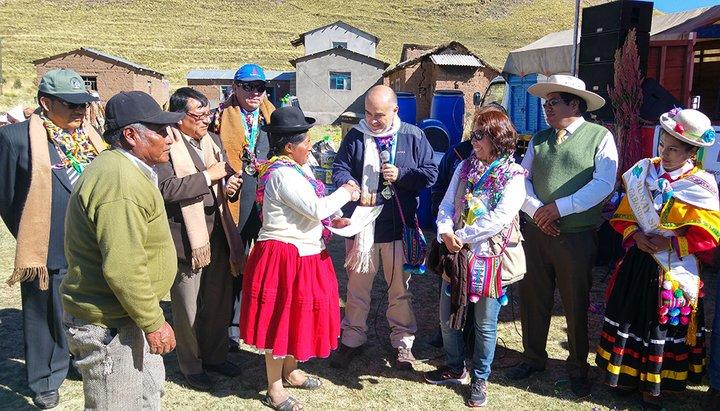Realizing farmers’ rights through community biodiversity management

Two new briefs examine how a community-based approach to crop diversity management, including supporting community seedbanks, can empower and benefit smallholder farmers and farming communities economically, environmentally and socially.
A community-based approach to the management of agricultural biodiversity, including supporting community seedbanks, can empower and benefit smallholder farmers and farming communities economically, environmentally and socially. This approach makes implementing farmers’ rights at national level both practical and effective contributing to food and seed security, sustainable livelihoods and resilience.
The importance of farmers’ rights is recognized in Article 9 of the International Treaty on Plant Genetic Resources for Food and Agriculture (Plant Treaty) that states “the enormous contribution that the local and indigenous communities and farmers of all regions of the world, have made and will continue to make for the conservation and development of plant genetic resources which constitute the basis of food and agriculture production throughout the world”.
In response to the request of the Plant Treaty Secretariat to gather “information at national, regional and global levels for exchanging views, experiences and best practices on the implementation of Farmers’ Rights”, Bioversity International has prepared two briefs on Realizing farmers’ rights through community-based agricultural biodiversity management and Supporting community seedbanks to realize farmers’ rights. The briefs will be presented at the Global Consultation on Farmers’ Rights, Indonesia, 27-30 September 2016.
Article 9 of the Plant Treaty gives, as examples, four farmers’ rights: the protection of farmers’ traditional knowledge; benefit-sharing; participation in decision-making; and the rights of farmers to save, sell and exchange seed.
Bioversity International’s research provides evidence that farmers’ rights can be effectively implemented through a community-based approach that is responsive to local conditions and builds on traditional knowledge and practices of farming communities. Such approach can be supported through research on: identifying and rewarding custodian farmers, encouraging farmer research groups (e.g. farmer biodiversity schools), establishing and supporting community seedbanks, promoting neglected and underutilized native crops and species, promoting nutritional value of crop diversity, using crop diversity for pest and disease management, supporting farmer seed producer- and marketing enterprises, organizing seed and food diversity fairs and festivals, and strengthening smallholder seed systems through the development and implementation of policy and legal measures.
Strengthening and supporting women and men smallholder farmers and their communities to manage agricultural biodiversity effectively promotes food and seed security, sustainable livelihoods and resilience.
The consultation in Indonesia will address why farmers' rights matter, explore different challenges for their realizations and identify possible ways of further strengthening the realization of Farmers' Rights.
Bioversity International scientist Ronnie Vernooy will present on “Community seed banks around the world – preconditions for their success” in a session on “Possible ways forward”. The event will also see the participation of two of our partners in Bolivia and Nepal who will present their experiences in supporting farmers’ rights.
Ximena Cadima, from Fundación PROINPA, Bolivia will present work that PROINPA has carried out on defining and identifying farmers who are good producers of native and traditional seed varieties and putting into place incentives for these farmers to continue operating. PROINPA is exploring alternative registration and certification mechanisms that rely on the characteristics of the producers, the production mode or the geographical provenance of the seed, instead of on the seed characteristics exclusively, as classic systems do.
Deepa Shresta, from the Nepal Agricultural Research Council, has been leading a study on limitations and possible incentives for different actors in the seed value chain to increase the varietal and genetic diversity useful for farmers.
Download the briefs:
- Realizing farmers’ rights through community-based agricultural biodiversity management
- Supporting community seedbanks to realize farmers’ rights
Look at Vernooy's presentation on “Community seed banks around the world – preconditions for their success”
Photo: Farming communities attending rewards (in-kind and social recognition) handover ceremony for successful conservation of rare quinoa varieties. Huataquita, Puno Region, Peru. Credit: Bioversity International/A.Drucker
_____________
This research is supported by CGIAR Fund Donors
